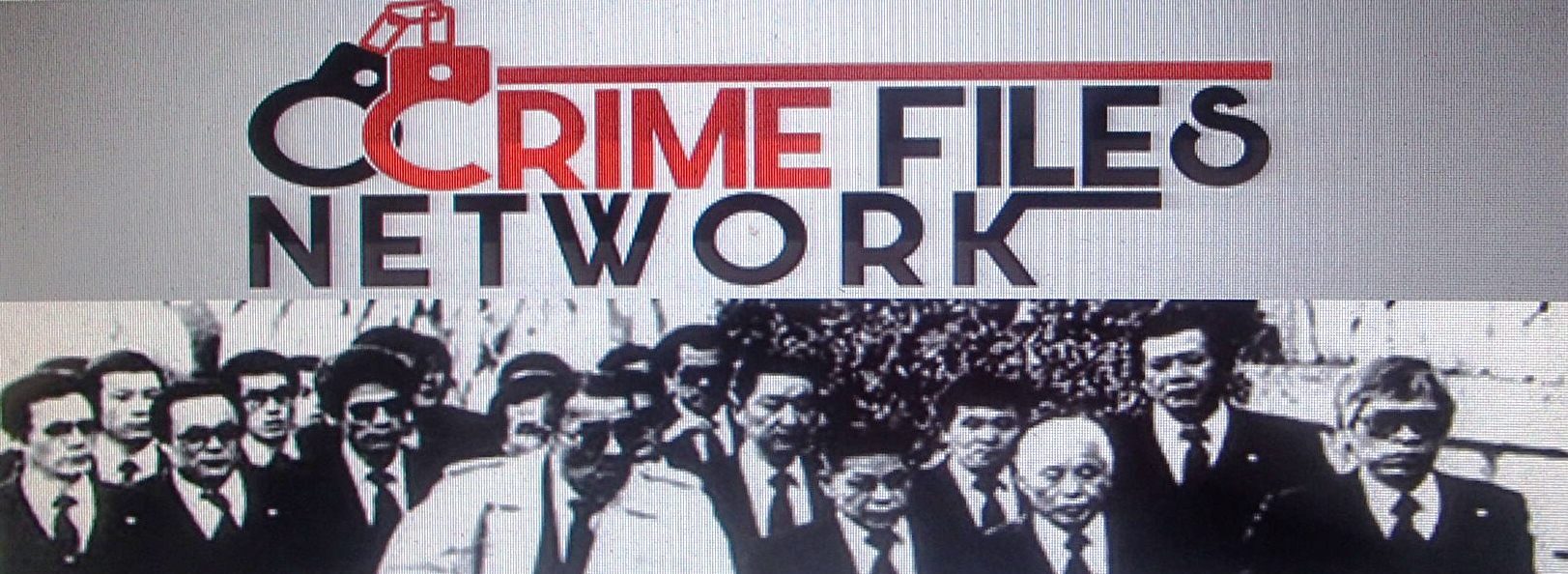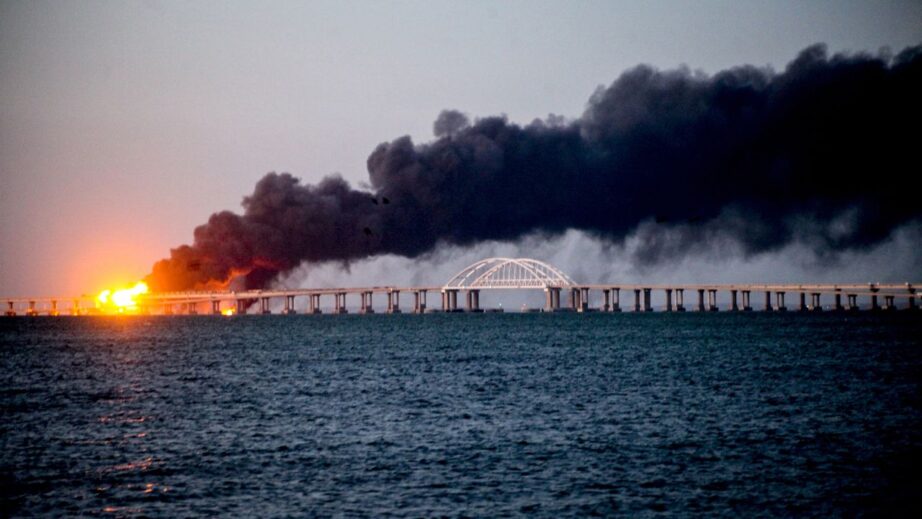CRIMEA IS BURNING & RUSSIANS LIVING THERE ARE BURNING DOWN ALL RUSSIAN FACILITIES & ARMY BASES THERE. EVEN THE RUSSIAN NAVY PERSONNEL ARE DESERTING CRIMEA, UKRAINE IS ON THE MOVE TO RETAKE CRIMEA
A large explosion heavily damaged the Kerch bridge that links Russia’s mainland with annexed Crimea, in a devastating blow to Russian President Vladimir Putin’s war effort in Ukraine. CNN’s Fred Pleitgen reports on the aftermath
Last week, a series of blasts at a military airfield in southern Crimea wiped out a good portion of the air power and munitions stores of the Black Sea fleet’s 43rd naval aviation regiment, and sent beachgoers rushing for cover. That attack, according to a Ukrainian official, was carried out in part by special forces officers working with local partisan fighters.
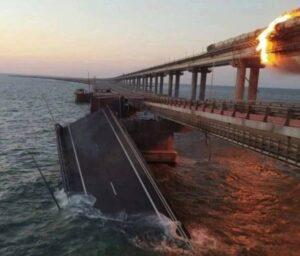
In the attack on Tuesday, at least two civilians were wounded, and power lines, railroad tracks and homes were damaged in multiple detonations, in the village of Mayskoye, Russian officials said. As many as 3,000 people were evacuated from the area, and local residents in Crimea said that the authorities there had introduced a “yellow level terrorist threat” alert, searching people as they entered parks and public buildings.
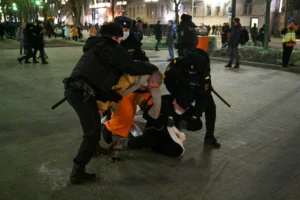
“The people of Melitopol are holding out and the resistance forces are neutralizing everything” that the Kremlin-backed regime has imposed, he said.
In addition to reinforcing and defending their positions in southern Ukraine, Russian forces have continued to barrage Ukrainian towns, cities and defensive positions across hundreds of miles in northern and eastern Ukraine.
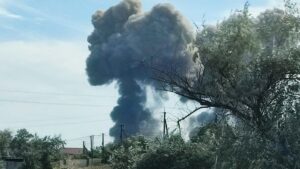
An analysis by The New York Times of several photos and videos shows a large fire burning west of Mayskoye, on Tuesday, and a satellite image shows smoke rising from the same site. Videos taken by passers-by before the explosions and verified by The Times show military vehicles parked in the nearby village, including what appear to be mobile multiple rocket launchers emblazoned with the ‘Z’ Russia uses to identify its forces.
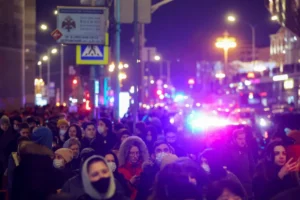
About 11 miles from the location of the explosions, a transformer substation in the town of Dzhankoi was also on fire. The cause was not evident, but it is near another site where hundreds of Russian military vehicles were filmed in the weeks before.

Even before those explosions, there were signs that people on the peninsula, a popular vacation spot, were either being moved or were feeling unsettled enough to leave. A record 38,000 cars on Monday drove in both directions across the 12-mile bridge linking Crimea and Russia, the state news agency Tass reported.
“The queue these days to leave Crimea for Russia across the bridge proves that the absolute majority of citizens of the terrorist state already understand or at least feel that Crimea is not a place for them,” President Volodymyr Zelensky of Ukraine said in his nightly address.
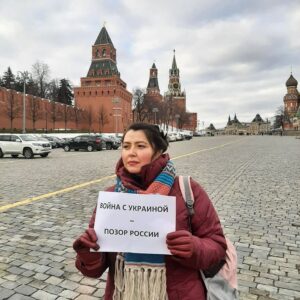
Ukraine’s leaders have not publicly claimed responsibility for any of the recent blasts, holding to a policy of official ambiguity about attacks far behind the front lines. But Mr. Zelensky and one of his advisers, Mykhailo Podolyak, appeared to hint at Ukrainian involvement.
“A reminder: Crimea of normal country is about the Black Sea, mountains, recreation and tourism, but Crimea occupied by Russians is about warehouses explosions and high risk of death for invaders and thieves,” Mr. Podolyak wrote on Twitter. “Demilitarization in action.”
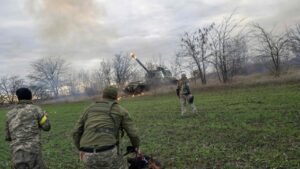
Mr. Zelensky praised those helping Ukraine’s intelligence services and special forces, and warned civilians in Russian-held territory to stay away from Russian military installations. “The reasons for the explosions in the occupied territory can be different, very different,” he said, but they all result in damage to Russia’s military.
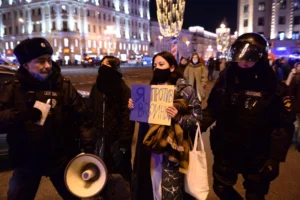
After Mr. Putin launched his full-scale invasion of Ukraine on Feb. 24, Russian forces lunged north from Crimea and quickly captured a large swath of territory in southern Ukraine, including the Kherson region, which Russian forces almost fully control. Russia is now using Crimea to funnel troops and supplies, and provide air and logistics support to its forces in Kherson and the neighboring Zaporizka region, where Ukraine has been attacking Russian supply lines and threatening a major counteroffensive.

Pavel Luzin, an independent Russian military analyst, said that “Russia’s possibilities on the battlefield are being limited” by Ukraine’s attacks in Crimea.
“It cannot seize the initiative, because there are not enough resources,” he said of the Russian military. “Crimea is the only way to support the grouping of troops in the Kherson and Zaporizka regions. Otherwise, this grouping of troops does not exist.”
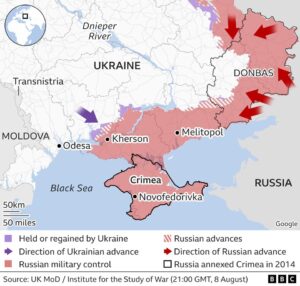
Now the question is how Russia responds to the attacks. In April, Russia’s Defense Ministry warned that it would retaliate against future Ukrainian strikes on Russian territory by targeting “decision-making centers” in the capital, Kyiv.
In July, Dmitri A. Medvedev, the vice chairman of Mr. Putin’s security council and former president, said that in the event of an attack from Ukraine against Crimea, “Judgment Day will come for all of them over there at the same time.”
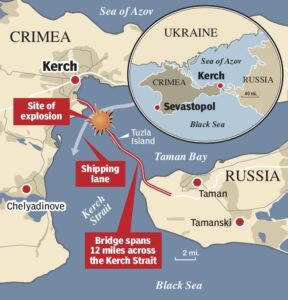
After Tuesday’s blasts, some pro-Kremlin commentators were calling on the military to make good on those threats. Andrei Klishas, a senior lawmaker from Mr. Putin’s United Russia party, said in a social media post that “Russia’s retaliatory strikes must be very convincing.”
“This is about protecting our sovereignty,” he wrote.
But Mr. Putin, who addressed a security conference in Moscow by video link on Tuesday a few hours after the early-morning blasts in Crimea, made no mention of the attack. He said Russia was prepared for a lengthy war, even if many more Ukrainians would die, repeating his frequent argument that a Western-allied Ukraine was an existential threat to Russia. The West, he claimed in his speech, was using Ukrainians as “cannon fodder” in its conflict with Russia.
“The situation in Ukraine shows that the United States is trying to draw out this conflict,” he said.
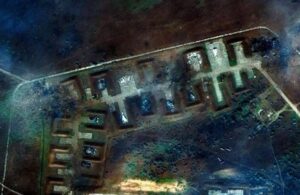
With little movement on the battlefield in the last month, the Kremlin has tried to cement its control over occupied territories, attempting to repeat the illegal annexation process it performed in Crimea in 2014, according to Western analysts. Russian forces and their proxies have arrested hundreds, doled out Russian passports, replaced the currency with rubles and rerouted the internet through Russian servers — putting pressure on Ukraine to disrupt that work.
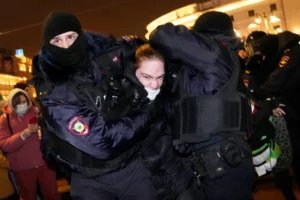
Two explosions in the occupied city of Melitopol knocked out pro-Kremlin television broadcasts on Tuesday, according to the city’s deposed Ukrainian mayor, Ivan Federov. Details about the blasts could not be independently confirmed, and it was not immediately clear who was responsible. But Mr. Federov said the episode emphasized that opposition to the Russian-installed authorities would continue.
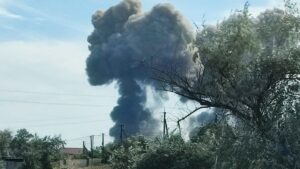
“The people of Melitopol are holding out and the resistance forces are neutralizing everything” that the Kremlin-backed regime has imposed, he said.
In addition to reinforcing and defending their positions in southern Ukraine, Russian forces have continued to barrage Ukrainian towns, cities and defensive positions across hundreds of miles in northern and eastern Ukraine.
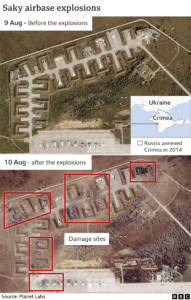
In the northeastern city of Kharkiv, Russian shells exploded on roads, hit infrastructure and destroyed other buildings in five of the city’s nine districts, according to Ihor Terekhov, the city’s mayor.
He said it had been “a long time” since Russian forces had hit so many different parts of the city at once. The number of casualties was still being assessed.
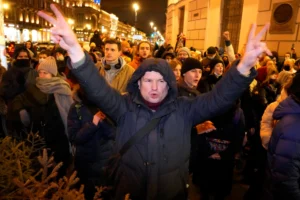
Michael Schwirtz reported from Odesa, Ukraine, and Anton Troianovski from Berlin. Marc Santora contributed reporting from Kyiv, Ukraine, and Cora Engelbrecht from London and Christiaan Triebert from New York.
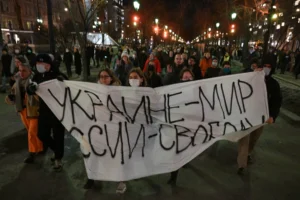
Thousands of Crimean protesters take to the streets against Putin’s war with Ukraine
![]()
